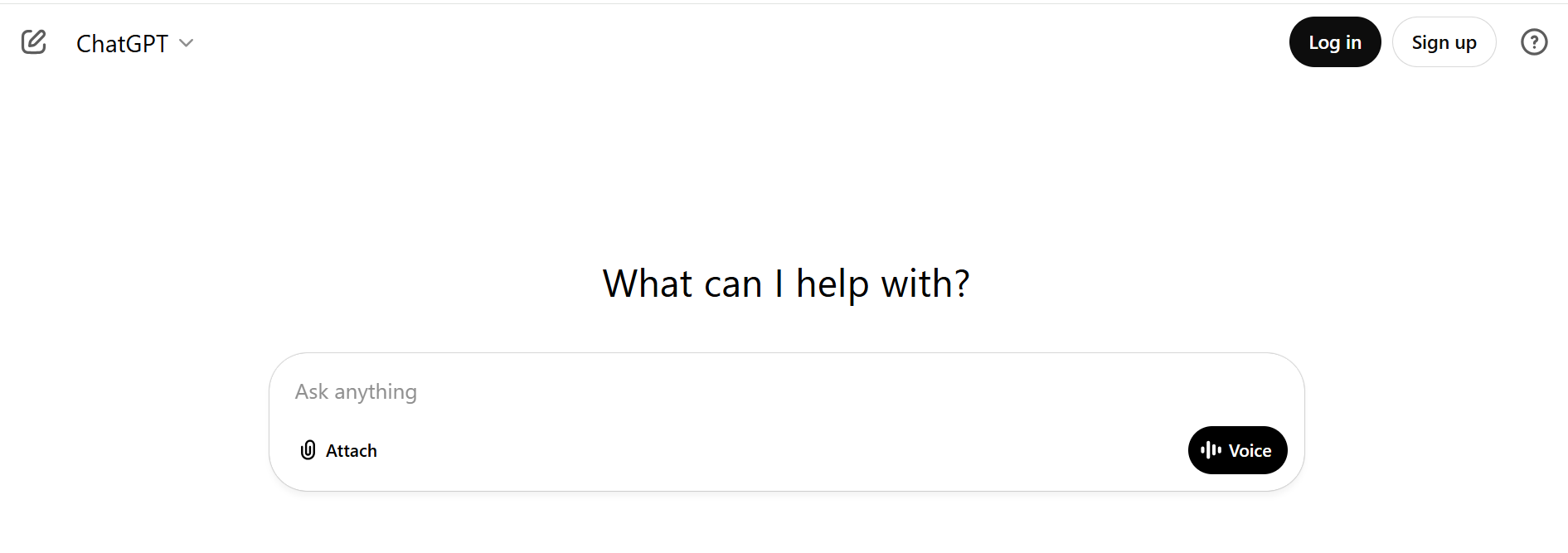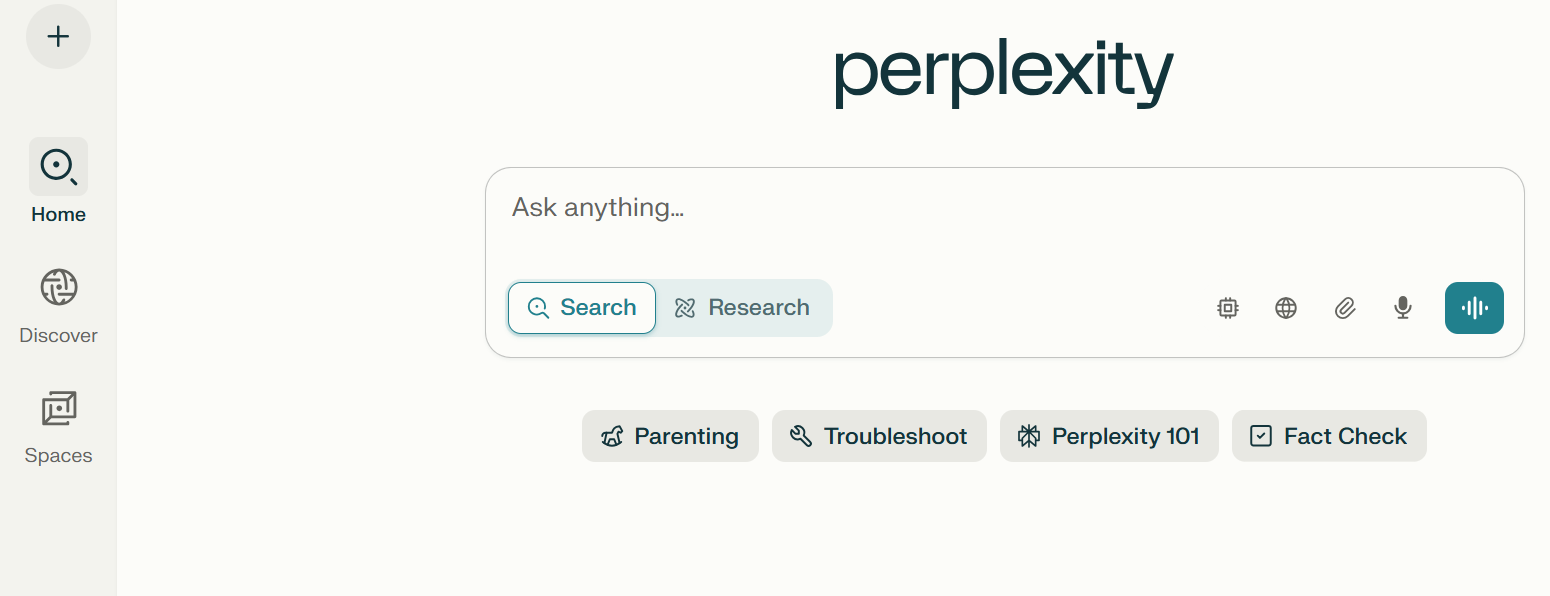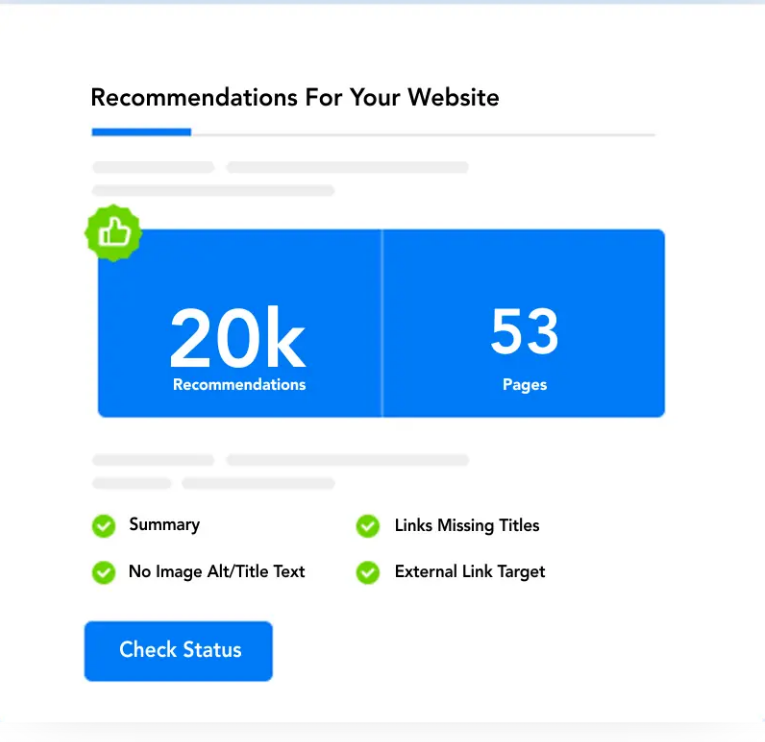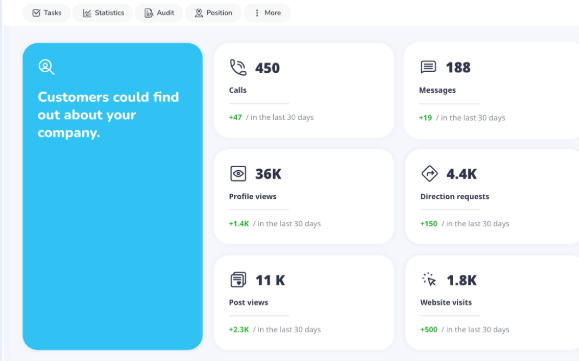With artificial intelligence (AI) and search engine optimization (SEO) integration, we’ve passed the stage of what-ifs. These days, we watch closely how and how soon the digital landscape will reshape. And we need to be ready to weather the storm.
At the moment, AI and SEO go hand in hand with digital marketing activities, complimenting each other. These activities are:
- nurturing brand awareness,
- best SEO practices,
- keyword research,
- content creation,
- content personalization,
- understanding users’ intent,
- building internal links and valuable backlinks,
- technical SEO,
- predictive analytics,
- monitoring and measuring data.
We came to the point when AI supports SEO all-wise. At the same time, we have one more trend of AI search systems altering user behavior and we are still to figure it out. 34% of Google search engine results pages (SERPs) now feature AI Overviews, up from 25% in September 2024.
The safe strategic approach here is to learn how AI impact SEO of your website and adapt how to use AI for SEO optimization strategies for your profits.
We’ll do exactly that in this article!
What is AI in SEO?
AI in SEO is a search engine optimization approach powered by artificial intelligence (AI) technologies. This approach brings more organic traffic and accelerates the SEO performance of a webpage in search engines like Google, Bing, or Baidu.
By AI, we usually understand machine learning (ML) algorithms based on neural nets, which process enormous chunks of data. They single out patterns, predict interconnections or create new digital deliverables, like online content, songs, images, code, 3d models, videos, etc., carrying out tasks without precise instructions.
Speaking about routines, the tasks SEO teams used to do manually, like identifying long tail keywords, calculating keyword occurrences, doing other maths, writing outlines and blog articles, are now performed by AI and machine learning in SEO.
AI might also become a new way of organic search for users. In the end of 2024, ChatGPT was the primary AI search tool in the US. Its engagement with users has grown from 1% in June 2024 to 8% by late 2024. And we’ll discuss the recommendations on this point in the article below.

Elizaveta Pavlovskaya,
SEO and Content Marketing Strategist, Digital Growth Expert
Expert tip
We shouldn’t overlook the traditional SEO impact. The higher your positions in organic search are and the more relevant keywords you cover on your site, the better your chances are to be considered as an expert source by AI search systems.
Adsterra simplifies the monetization of your SEO content traffic with ads. You can pick from ad formats, including In-Page Push, Native Banners, and Popunders and place it on your site. Adsterra’s anti-AdBlock feature helps increase revenue up to 35%. Alternatively, earn money with Smartlink (Direct link) that doesn’t take ad space at all.
Understanding the role of AI in SEO
To better understand its role, let’s identify the ways of how AI drives SEO. Let’s differentiate types of SEO-related AI platforms in simplified, layman’s terms:
- SEO tools. These are AI-powered, SEO-specific tools or all-in-one solutions, like SurferSEO, Frase, MarketMuse, Clearscope, Semrush, etc.
- Content writing AI platforms. They are usually built with Generative AI: Jasper AI, Writesonic, Copy.ai, Sudowrite, etc.,
- AI search systems. They focus on intent and context to provide relevant data instantly. Operating without traditional indexing methods, they don’t rank but cite data from webpages. Among them are ChatGPT, Google SGE (Search Generative Experience), Microsoft Copilot, Perplexity AI, etc.
- AI-powered search engines: Google AI Overview, Microsoft Copilot, and Baidu Ernie Bot.
AI-powered SEO in a triple perspective
AI SEO optimization strategies need to focus on adapting to changes in search engine algorithms. You’re well set up if you treat AI-powered SEO as a triplet:
- You’ve got your AI-powered tools for data-driven decisions on demand.
- You use AI search systems for more valuable insights to enhance your SEO strategy. For example, to discover more keywords or research competitors’ strategies.
- You try to get into the discoverability zone of the AI search system for your audience to find your website.
Table 1. AI power and SEO in a triple perspective
| AI application | AI tools | AI search systems | AI search optimization of your website visibility |
| Benefits | -speed -scalability -precision | -real-time results -streamlining of repetitive tasks | -citation of your website or blog for potential viewers |
| SEO tasks/ results | -keyword data research -content optimization -technical SEO upgrade -competitors’ analysis -prediction of future search trends | -instant SEO insights for missing parts of your SEO strategy -highlights of opportunities and future search trends | -lead generation |
| Challenges | -persistent regularity -ongoing testing -costs | -fact-check -plagiarism-check | -emerging trend -limited data on best practices to optimize content for AI search |
| Tips | -look for the reasonably priced all-in-one solution | -experiment and hone your prompts -try different AI engines | -grow personal brand -publish unique data, research, first -hand reviews -post diverse visuals and multimedia -be active in forums and communities -add conversational queries (voice search, long tail keywords)to posts |

Elizaveta Pavlovskaya,
SEO and Content Marketing Strategist, Digital Growth Expert
Expert tip
Always keep in mind the synergistic effect of your web presence and brand awareness. Don’t underestimate the importance of your presence on social media networks, forums, and online communities. Participate actively and be noticed and mentioned, which will positively impact your brand recognition and increase your chances to appear in AI search results.
AI and SEO practices and impact
AI has produced an outstanding influence on SEO efforts. Apart from the weighty impact of AI-assisted SEO tools and AI search systems, we witness the change in users’ behavior.
For example, 13.14% of queries showed up in Google featured AI Overview in SERPs in March 2025. It’s up from 6.49% in January 2025, according to Semrush study.

Google AI Overviews spit out personalized results in search results that are more relevant to the users’ intent than ever before. These results are sometimes enough to hinder users from clicking the links below as they would normally do, leading to zero clicks.
Such related SEO processes stimulate strategic thinking and pay attention to the following emerging factors that transform users’ search behavior. Here are a few tips that can serve as a checklist for SEO audits and planning.
Table 2. AI and SEO: impactful factors and tips
| Factor | Impact | SEO tips for your content copy |
| Natural language processing (NLP) | More conversational queries | Insert real-speech phrasal and long tail keywords to your content. |
| Contextual understanding | Search intent, relevance, context | Create contextual, semantically coherent content so that algorithms can “read” it. Verify your user intent is correct. |
| Instant data interrelation | Data analysis without precise instruction | Prefer deep and accurate content creation instead of SEO overoptimization as well as boosting your brand recognition. |
| Personalized results | Coherence with prior query results | User-first content approach with conversational, voice-procused queries. |
"Adsterra offers high CPM and it was not as difficult as I had anticipated earlier." Here is the real-life story of our Partner, publisher, entrepreneur, and professional blogger, Humphrey Mwiinga, how he made his first $1006 on Adsterra with ChatGPT.
How to leverage AI for SEO
Considering the key factors of AI impact on SEO, let’s examine the traditional SEO tactics, like keyword research, technical SEO, and content creation process.
Keyword research with AI
How to do the keyword research with the help of AI for SEO aspects? Here is a quick overview. Once you define your main topical area for your audience, start your target keyword research.
This is how we can dissect target keyword research, applying the artificial intelligence SEO:
1. Research. Most keyword research tools employ machine learning algorithms and natural language processing to give out semantic analysis. They provide you with audience preferences, intents, and simple keyword matching.
Apart from the usual sources, Google autosuggest queries, the People Also Ask section, and the People Also Search section, you can utilize AI-powered tools like BuzzSumo, AnswerThePublic, and Google Trends to find search queries and identify emerging topics in your industry.

2. Clusterization, also called keyword grouping. Some AI SEO tools will find and group keywords for you so you can decide with semantics in mind whether to write one or a few articles. Alternatively, you can use a separate tool for clustering.
3. Low search volume and low keyword difficulty. With the help of the same AI SEO tools, you can spot keywords with low volume and low difficulty. These keywords show less competition in the search results. Low-volume longtails are usually the conversational-language queries that have more potential to get your pages cited in AI search systems and, consequently, more relevant traffic.
4. Search intent (commercial, informational, transactional, and navigational). It is imperative to clarify the search intent for your keywords to generate high-ranking content. It’s also necessary for AI systems to notice your content.
AI searches also deliver data-driven insights for your keywords, that are hard to spot. It’ll fill the blanks for more keyword data that is in the market for optimizing existing content.
For example, if your target audience craves iGaming, you may get not only “online gaming,” but “free spins” or “no deposit spinner” and alike. If you are interested in how to approach iGaming SEO and get the best results in the changing environment, check out our fresh guide.
AI-driven content creation and optimization
The good news is there are a few ways we can accelerate content creation to be favored both by search engine algorithms and AI systems.
SEO content creation
As Google explains in its blog, automated content, including AI-generated content, is not all spam and is rewarded if it’s original, high-quality content. That is why it’s a worthy idea to create content for your target audience, using Generative AI and other AI-powered SEO tools.
Matching AI and human creativity
This relates closely to the previous paragraph. Keep your content relevant and of actual high quality with close human supervision. Make it sound non-robotic, authentic, and genuine. Even if you write content copy yourself, use tools like grammarly.com to see if your texts have patterns that resemble non-human text and tweak them up.
Meta-data analysis and creation
AI tools, like SurferSEO, enable marketers to generate competitive, relevant, and appealing title tags by analyzing competitors and search results.
New semantical themes
AI helps with SEO, when analyzing vast amounts of data and generating new hot topic ideas that your audience would love to engage with. And it does it within minutes.
EEAT
Experience, expertise, authoritativeness, and trustworthiness (EEAT) are as relevant for AI search systems as for Google, which weighs out a website’s content quality. As user behavior changes, producing SEO content is not enough. To be likely to get into AI search system citations, site owners and SEO experts focus on being present and recognized in the digital space and building your brand awareness, trust, and authenticity at all angles and levels.
Repurposing existing content
Freshly posted content gives more credibility and appeals to the audience. It’s worth leveraging AI to re-fresh or repurpose your existing content per current trends in search behaviors and search intents. Once you’ve generated a draft with the help of AI, take some time to perfect it and make it irresistible for your target audience.
Personalizing content through AI recommendations
AI systems are trained to develop high-content personalization. You can apply AI tools to update your content so that it aligns with users’ preferences, prior search queries, and behavior.
Technical SEO enhancements using AI
AI continues to reshape technical SEO. It offers powerful tools that help automate and analyze technical SEO issues with skyrocket speed and fantastic scale. However, the challenges and responsibilities for site owners who apply SEO are not going anywhere.
Key applications of AI in technical SEO
Site crawlability & indexability
Artificial intelligence scans website structure and configurations (robots.txt, sitemaps, canonical tags) to ensure everything is in its place for crawling and indexing.
Site architecture & UX
AI tools help improve navigation and structure by identifying layout issues and organizing content for both users and search engines.
Broken link monitoring
AI can detect broken and spammy links and suggest what needs to be fixed, preserving the authority and credibility of your website. AI helps audit, suggests improvements, repairs 404 errors, and keeps the link structure healthy.
Duplicate content detection
AI monitors semantically identical content, which is necessary to avoid penalties. AI helps to find duplicate pages to prevent webpages competition in SERPs that may hinder their potential for search ranking.
Sitemap management
AI can create and update XML sitemaps in real time, helping ensure all content is properly indexed.
Website speed and Core Web Vitals
AI tools highlight bottlenecks and technical issues in order to boost load page speed. It tracks and gives recommendations to lightweight your media and visuals, fix CLS and LCP issues.
SEO forecasts
AI carries out predictive analysis and runs A/B tests to distinguish top-performing strategies.
Ongoing performance tracking
AI-powered platforms can demonstrate real-time performance tracking of your website pages and offer data-driven recommendations for continuous improvement.
Meta tags and schema optimization
AI suggests meta title and meta description to improve SERP visibility and click-through rates.

Elizaveta Pavlovskaya,
SEO and Content Marketing Strategist, Digital Growth Expert
Expert tip
Please remember introducing schema markup is a good tactic per SEO best practices, as well as helps AI search systems to better understand your website content.
Technical challenges with AI driven SEO strategies
1) Over-reliance risk. With AI tools, there is a chance to shift from a deep understanding of SEO to purely relying on the generated data. There are always ways to prove data with a few other source and tools. Be sure to approach and analyze data critically.
2) Need for continuous learning. As the SEO world is rapidly changing, there is a prolonged need to learn, explore new SEO features, and test to effectively integrate AI into SEO strategy.
3) Automation paired with expert knowledge. AI SEO can provide advanced automation and boost the performance of repetitive tasks. However, AI has to go hand in hand with skilled SEO knowledge, experience, and human expertise.
You don’t have to look for advertisers to monetize the traffic that you generate with SEO. With Adsterra, you can get access to over 15K+ advertisers that are ready to buy your traffic. There is no threshold amount for views or clicks to register. Join Adsterra ad network, and start earning revenue immediately.
Monitoring and analyzing performance with AI
AI-and-SEO tools and machine learning algorithms have reshaped the SEO landscape drastically. Instead of manual audits and analysis, we have continuous monitoring of data in real time, like page load times, bounce rates, crawl errors, keyword search engine rankings, and loads more.
All the critical metrics for website health and its pages are at your fingertips in minutes on demand. Performance monitoring of SEO metrics becomes holistic, rocket-speed, and more strategic, allowing for more flexibility and sustainability in SEO growth.
Top AI tools for SEO in 2026
Let’s look into AI-powered SEO tools that can be extremely helpful in developing a robust SEO strategy for your website in 2026.
Semrush
It provides an all-around picture of keyword research and clusters, site audits, backlink profiles, competitor analysis, snippet overviews, and daily and weekly SEO analysis reports. It also provides its own SEO Academy. Harnessing their AI Toolkit enables you to analyze and boost your AI brand online visibility. It offers actionable insights to refine your business strategy and strengthen your market position.

SurferSEO
It’s one of the most well-known AI SEO platforms for content optimization. It stands out by offering real-time, data-backed recommendations to improve on-page SEO. It researches, audits, writes, does a plagiarism check, optimizes and generates SEO content.

Frase
It’s an all-in-one specialized SEO and AI writing platform. It focuses on assisting website owners and marketers with crafting AI-generated content, creating briefs, and uncovering the most relevant user questions for your content opportunities.

MarketMuse
It delivers content gap analysis and overall content inventory, guiding your strategy by showing where your site can outperform competitors. It helps you research, plan content-related tasks, and pinpoint high-value semantic clusters.

Clearscope
It is a specialized content SEO tool powered by AI. It focuses on semantic keyword enhancement so that you can create content in line with the way users search in browsers.

ChatGPT
It plays a key role in ideation and generating first-draft content for many creators. It assists SEO teams and marketing agencies in scaling their content output. It maintains relevance and coherence for repeated SEO tasks. By experimenting with clear and detailed prompts as questions-answers, you can achieve excellent results and boost your SEO strategy manifold even free of charge.

Perplexity
It’s a great free AI-assisted platform that provides SEO and content-related answers in real time. Just like ChatGPT, it can be used for brainstorming, content creation, topic and keyword research, and data analysis.

Alli AI empowers SEO professionals and site owners with an all-in-one platform to enable overall website optimization. It covers in-depth keyword research, rank tracking, site auditing, and backlink building.

Localo
It’s a multi-tool to help with local SEO. Among other features, it generates free local business schema, checks local ranking, tracks your business’s Google visibility, and fulfills other local SEO tasks.

Writing AI tools and SEO
Here is a table with details on more writing AI SEO tools specifically launched to help write and optimize content.
Table 3: More AI writing tools for SEO and content marketing
| Tool | What It Does | Why It’s Useful |
|---|---|---|
| Jasper AI | Creates marketing copy, blog posts, social captions | Optimized for brand voice |
| Writesonic | Generates SEO content, real-time data via Chatsonic | Fast output with current trends and search intent |
| Copy.ai | Crafts ad copy, product descriptions, blog drafts | Customizable templates and quick content generation |
| Sudowrite | Aids in creative writing and storytelling | Ideal for long-form or narrative-driven content |
AI and SEO: Looking in the future
One of the most paramount changes that AI is bringing to SEO is the necessity to optimize for AI traffic. At the moment, we start monitoring AI SEO efforts that lead to AI search system citations.
Memo for creating AI-friendly content
- Create optimized content for search engines within best practices.
- Structure your content for better parsing.
- Match user intent.
- Optimize for conversational, question-based queries.
- Create authoritative, comprehensive and citable content.
- Use stats and quotes.
- Reference authoritative sources.
- Adapt content to the specifics of each system.
- Don’t overlook online presence like communities and forums.
- Keep up-to-date with AI algorithms. Identify trends.
SEO plus AI success lies in leveraging automation wisely. Whether you’re analyzing search results, optimizing for semantic search, or drafting high-converting content, AI-integrated SEO workflow gives you a distinct edge in the competitive digital landscape of 2026.
However, AI-powered platforms offer comprehensive support for both technical and creative aspects of SEO only together with a human-approved strategy, experience, and expertise.
Adsterra makes it very simple to start earning by placing ads on your website. You can leverage 220K+ new ad campaigns every year, high and stable CPM rates, 100% fill rate with quality ads, and prompt and agile 24/7 support thanks to the unique Partner Care Program. Join now to start profiting from your SEO strategies.
AI and SEO FAQ
Is AI used in SEO?
Yes, AI help with SEO is a long-term trend for a website’s visibility in digital marketing. AI helps businesses to attract and measure organic traffic. Alongside Google Analytics and Google Search Console, website owners can use other tools based on AI SEO optimization and machine learning (ML).
Will SEO be replaced by AI?
SEO will hardly be replaced. AI tools have streamlined the search engine optimization process manifold, giving room for creativity and development that usually take a lot of time that creators and marketers are short for. That said, we can now build full-fledged, successful AI-driven SEO strategies, applying on-page optimization strategies, SEO best practices, meta tags, and internal linking strategies.
Is AI content ok for SEO?
Yes, the AI content is totally ok and can assist you in many aspects of your AI assisted SEO. The main takeaways are to be consistent in your keyword research and get well-versed in creating prompts for AI. Alongside, ensure to always fact-check, plagiarizm-check and humanize your content, as well as adhere to Google’s traditional SEO practices and quality requirements.
Does SEO have a future?
In the ever-evolving digital landscape, SEO has been growing and transforming for years. It’s likely to be further transformed as we look into the future. We may see more changes in how to use AI for SEO optimization. Currently, the future best practices will go on to boost overall user experience and team with Natural Language Processing (NLP) impact and voice-search-orientated optimization, user-first and mobile-first approach, and data-driven decision in AI and SEO.
